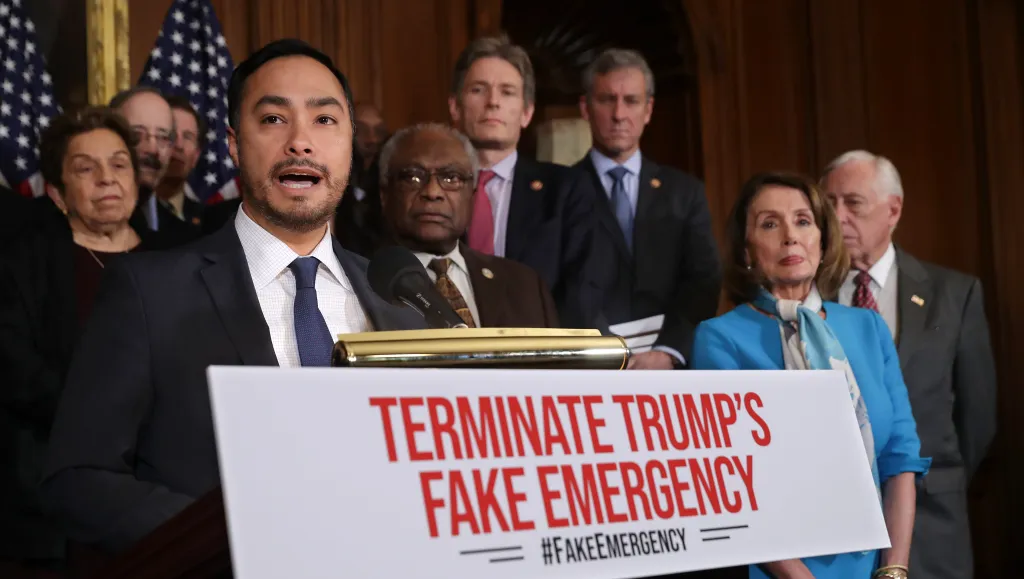Region: National
Eliminating the Endangerment Finding Doesn’t Mean the Government Can’t Regulate Cars and Trucks
The Clean Air Act and Energy Independence and Security Act still give EPA, California, and NHTSA significant power.
The withdrawal of EPA’s endangerment finding is bad in many respects that I don’t want to downplay and that many have already focused on. But it’s also worth stressing that, should a president take office in 2029 who cares about climate and air pollution from cars and trucks, the federal government — and California — …
CONTINUE READINGBring Back the Legislative Veto!!
Restoring Presidential-Congressional balance also restores the Constitution’s vision of government — and could pay environmental dividends
One line that stood out in the Supreme Court’s opinion in the tariff case, Learning Resources v Trump, was this one from Neil Gorsuch: Once this Court reads a doubtful statute as granting the executive branch a given power, that power may prove almost impossible for Congress to retrieve. Any President keen on his own authority (and, …
Continue reading “Bring Back the Legislative Veto!!”
CONTINUE READINGPolicies on the Bus Go Round and Round
The Drain is a weekly roundup of environmental and climate news from Legal Planet.
A year ago, the transportation manager of Northshore School District, outside of Seattle, wrote to EPA Administrator Lee Zeldin pleading with him to release frozen funding she was owed for new school buses. “We need your assistance to complete these projects and lift the financial burdens school districts are facing due to the delay in …
Continue reading “Policies on the Bus Go Round and Round”
CONTINUE READINGDissecting EPA’s Endangerment Repeal: Series Wrap-Up:
Here’s what you need to know to understand the upcoming legal battles.
Yesterday was the last of five Legal Planet posts on EPA’s repeal of the Endangerment Finding, which it based on legal arguments that it has no power to regulate vehicle emissions of greenhouse gases. The series began with a quick overview of the issues. The remaining posts focus on the reasons that EPA was right to issue the Endangerment Finding in the first place in 2009, the legal precedents supporting the Endangerment Finding. and the impact of the repeal on future climate actions. The bottom line is that EPA was right to issue the Endangerment Finding and wrong to repeal it.
CONTINUE READINGTrump’s Ratepayer Protection Pledge: More BS on Electricity Prices
In his State of the Union address, President Trump announced a new “ratepayer protection pledge” from technology companies.
Last night, in his State of the Union address, President Trump announced a new “ratepayer protection pledge” from technology companies as his latest effort to respond to rising electricity prices across the country. In his brief remarks on the pledge, the President said that it “obligated” the technology companies to provide for their own power, …
Continue reading “Trump’s Ratepayer Protection Pledge: More BS on Electricity Prices”
CONTINUE READINGThe Tangled Web of the Boulder v. Suncor Cert Grant
Pass me some aspirin. Attorney General Rob Bonta might want some, too.
On Monday, the U.S. Supreme Court agreed to take up the Boulder v. Suncor Energy case, one of the growing set of state-law nuisance and consumer protection cases filed by states and municipalities against fossil fuel companies for harms from climate change. The Court will review the Colorado Supreme Court’s decision to allow the case …
Continue reading “The Tangled Web of the Boulder v. Suncor Cert Grant”
CONTINUE READINGHas Trump Actually “Driven a Dagger Through the Heart” of Climate Policy?
Don’t jump to conclusions based on the Administration’s spin operation.
there’s a good chance that the repeal of the Endangerment Finding will be reversed by the courts. That would ground federal climate policy even more firmly in the law, so the Administration is taking a gamble. Saying they’ve one is as premature as a roulette player who’s just put all their chips on one number announcing that they’re now rich before the wheel has even started turning. Even if the courts do uphold the repeal, a lot will depend on just what legal theory the judges adopt. Some legal theories would slam the door on efforts by future Democratic presidents. Others would leave room to move forward.
CONTINUE READINGMore Pesticides Please!
Trump’s ‘Toxics First’ Agenda continues with a new executive order mandating the production of glyphosate . . . as a matter of national security!
Late last Wednesday, sandwiched between all of the news about the repeal of the endangerment finding and the Supreme Court’s ruling on the Trump tariffs, the White House issued a new Executive Order invoking a Korean War era statute, the Defense Production Act of 1950, to ensure that chemical companies can continue to manufacture a …
Continue reading “More Pesticides Please!”
CONTINUE READINGWhat Happens to State Regulation if the Endangerment Findings are Gone?
Answer: State authority wouldn’t suffer from the change and might expand in some ways.
If the Trump EPA successfully repeals the endangerment findings for vehicles and stationary sources, states will be the only resort for climate regulation. A key question is how the repeals would impact state power to regulate carbon emissions. The bottom line answers are: (1) the impact on state power regulate tailpipe emissions seems unclear but could be positive, (2) there would be no effect on state power to regulate stationary sources like power plants, and (3) plaintiffs suing oil companies would probably benefit. The detailed analysis is below.
CONTINUE READINGPolitical Extinction Risk
Species may be vulnerable not just to changes in climate or habitat, but also to changes in politics
Conservation biologists have long studied many different kinds of risks to endangered species: Risks from climate change, or from habitat fragmentation, or from having small populations for extended periods of time. But there is another key component of risk that has not been analyzed yet, but may matter as much or more to many endangered …
Continue reading “Political Extinction Risk”
CONTINUE READING












